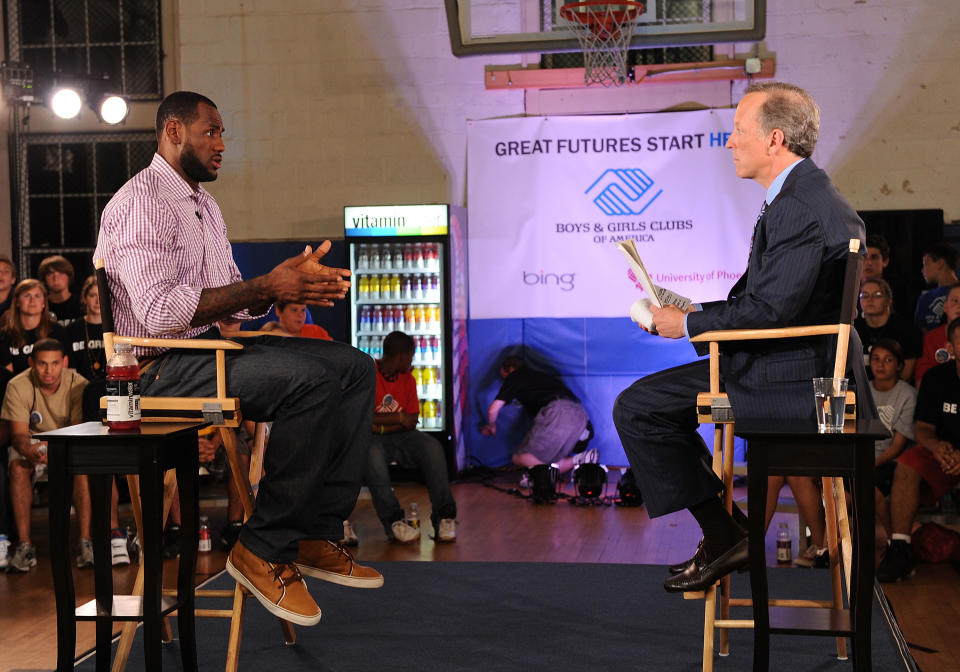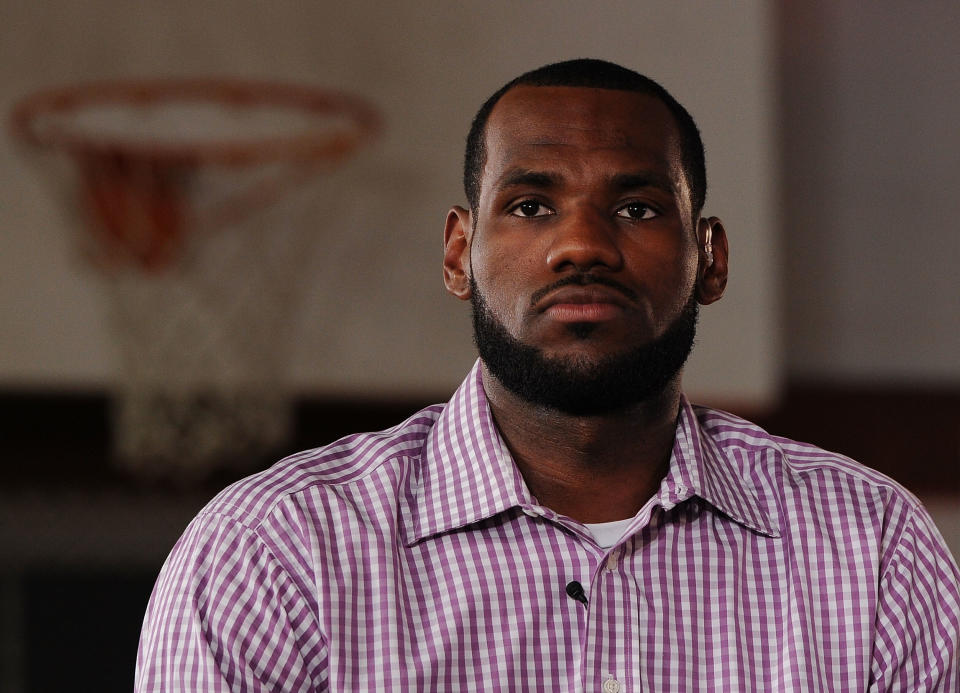How 'The Decision' helped LeBron James eventually rule the sports world
LeBron James looked fidgety and nervous sitting on an elevated dais facing Jim Gray on a July evening 10 years ago.
And while Gray was a handpicked selection to guide James through his dramatic “Decision,” James might as well have been staring down the athletic establishment, knowing a seismic change was coming.
It didn’t matter James helped raise $2 million for the Boys & Girls Clubs of America through the ambitious venture in Greenwich, Connecticut, on July 8, 2010. What mattered more than anything were a few words that eliminated the narrative of what could control an athlete and created a new paradigm for athlete empowerment.
“This fall, I’m gonna take my talents to South Beach and, uh, join the Miami Heat,” James said.
Whether James knew it or not, it ultimately became the most liberating moment of his career. He’d long empowered his own circle of confidants, friends Maverick Carter, Rich Paul and Randy Mims, beginning to eschew the usual model of what representation was supposed to look like and perform like for millionaire athletes.
Instead of the moment and subsequent time thereafter being treated as if James opened doors for people in his circle — Carter worked as an intern with Nike before working closely under Nike vice president Lynn Merritt, while Paul learned the craft of being an agent at Creative Arts Agency before launching Klutch Sports in 2012 — Team LeBron was treated by the masses with a level of disdain.
It was impossible for some to predict the way they’ve each created footprints in the culture and used their collective leverage to positively impact the world they came from while crossing over into the civic realm.
At that point, leverage was an illusion.
On that July night in 2010, it was hard to fathom a player making statements against police brutality on Black people, insulting a divisive president or aligning himself so closely with the marginalized without the fear of losing all he gained.
In a fan’s nightmare, he or she could see the manifestation of Michael Caine’s words in “The Dark Knight,” in which Caine’s character, Alfred, talks to Bruce Wayne about the perils of dealing with The Joker.
“Some men aren't looking for anything logical, like money,” Caine said. “They can't be bought, bullied, reasoned, or negotiated with. Some men just want to watch the world burn.”
James wasn’t diabolical like The Joker, but he held the trump card. Thus, his freedom led to Cleveland’s athletic world burning — or, more accurately, James’ jerseys in effigy.

And the usual structure of the NBA crumbled right along with it.
The hometown Cavaliers offered James the most money and, presumably, had the advantage of an inside track with the heartstrings. But James’ flex — one that led to so many changes in the league’s internal structure since — was that none of those things mattered when it came to the game’s best player exercising his right to free agency.
At that point, free agency was more a notion than practical reality, fun fodder without the actual payoff. Michael Jordan had a playful flirtation with the New York Knicks in 1996, but it was merely to get the Chicago Bulls to the table with an offer to his liking. Shaquille O’Neal was the biggest free agency get in league history to that point, leaving Orlando for Los Angeles in that summer of Jordan, but the Magic came to the table with an offer that indicated they didn’t believe O’Neal would ever leave.
And, the Lakers usually get the big men in purple and gold.
But James pulling off such an audacious act rubbed so many the wrong way because of the way he organized every chess piece in his world and the ancillary one around him. Teams courting him had to come to the IMG Center in Cleveland to pitch themselves as opposed to the player embarking on the usual cross-country tour.
And every 10 minutes there was an update on franchise whereabouts, rumors on who had the lead and how, all culminating during an ESPN special that had the world watching.
As nauseating as it felt and self-aggrandizing it came across in the moment — to be fair, the man did tell the media they could go to sleep and not wake up until July 1, 2010, because it would be a big day — the annoyance is because nobody could turn away from how compelling it was in the moment.
It became a landmark, much in the way Kevin Garnett’s groundbreaking six-year, $121 million deal with the Minnesota Timberwolves in 1997 led to the 1998 lockout. In James’ case, it led to a regrettable, coded letter from Cavaliers owner Dan Gilbert and an overall backlash about players teaming up as opposed to traditional team-building.
James hadn’t yet been crowned a champion, but his Q Score was relatively high to that point. “The Decision” was publicly panned as a tone-deaf move that didn’t factor in Cleveland’s sports history of being spurned. But it also revealed a resentment the general public can display when a player steps outside of a perceived boundary.
He was replaced as a national darling by a man who “quietly” signed a contract extension with the team that drafted him on the same day as “The Decision” — a fellow named Kevin Durant.
The discontent deepened when James, Dwyane Wade and Chris Bosh endured a rocky first season in Miami as they appeared to embrace being villains. So many rejoiced when James came up short in the 2011 NBA Finals against the Dallas Mavericks, the single biggest letdown of his career.
But through failure he found professional success and personal maturity, beginning to utilize his voice on matters that struck him in the heart. Wearing a hoodie to honor slain teen Trayvon Martin was the first move — one that may not have occurred if James weren’t living in Florida at the time, as the story hit home.
Even returning to Cleveland in 2014 to play for the same franchise that had so many negative things to say about him in the 2010 aftermath was a mark of freedom and — knowing he’d forever have influence over Gilbert — was the ultimate power move.
In those Miami years, James became a two-time champion and before you knew it, Paul and Carter became a force that couldn’t be ignored.
How LeBron overcame a possible burden and made it a positive
A common refrain in the Black community is “never forget where you came from,” a mantra that can feel more like a burden in some cases — one that doesn’t just apply to sports but to Black excellence in any endeavor in life.
Athletes feel the tug from their previous lives, to bring the people along from their community who helped them on the journey. Often, it looks like an entourage or in Phil Jackson’s words, “James’ posse” — carrying all the racial connotations with it.
But James took the negative and made it work for him. Who knows if Paul and Carter would’ve gotten into those rooms without James’ backing and trust, but they couldn’t have stayed there and thrived without their own competence, intelligence and vision.
They’ve taken that leverage and created some of their own, innovating with the worlds they’ve constructed and freedom they’ve obtained. Carter is more front-facing, with his ventures through Springhill Entertainment and Uninterrupted. He’s become a brand in itself, as you can hear his raspy voice on HBO’s celebrity-filled “The Shop.”
Paul prefers to work more in the shadows, building up a base of clients that will extend far beyond James’ playing career.

James, of course, has started his own school in Northeast Ohio and is far more willing to engage in political matters than most, recently partnering with Carter to combat voter suppression in Black communities.
He’s positioned himself to be the most impactful business athlete this side of Magic Johnson.
Have there been missteps along the way? Certainly, but those instances don’t discount the doors Team LeBron has opened together and apart. They symbolize a version of the American Dream that’s often seemed unattainable to those with Black skin.
Black people have long known their effects on the culture, through sports and entertainment. But it was important for the masses to see that type of power and influence from all sides, and honestly, to see Black faces at the forefront.
The James model can be replicated by so many down the line and can be his lasting achievement, even more than his on-court basketball excellence, which has him among the greatest players of all time.
Ironically, it was Durant who followed the model of defiance and freedom by signing with the dynastic Golden State Warriors in 2016 after James engineered a historic comeback over those Warriors in the NBA Finals.
Durant, though, did it on the Internet and not cable TV.
If there was a lesson to be learned from “The Decision,” it’s that power is best flexed as an illusion of it, and cashing it in at the right time. It’s hard to say whether some of James’ sponsors have been at the forefront of the racial discussion during this time of national reckoning because of James, but one can surmise they did not want to risk being on the opposite side of him and his team.
That night 10 years ago, James was sure of what he wanted to say and do, but uncomfortable with how to deliver it.
Now, he and his team know whenever they have something to say, they’ll have the ears of everyone they want — even if the audacity can make people uncomfortable.
More from Yahoo Sports:


